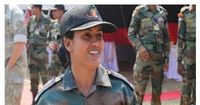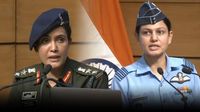In a historic moment for India's defense forces, two women officers, Colonel Sophia Qureshi of the Indian Army and Wing Commander Vyomika Singh of the Indian Air Force, co-led a press briefing on May 7, 2025, detailing the execution of Operation Sindoor. This operation, a decisive military response to a recent terror attack in Pahalgam, targeted nine terror camps in Pakistan and Pakistan-occupied Kashmir (PoJK) that were linked to notorious terror organizations including Lashkar-e-Taiba (LeT) and Jaish-e-Mohammed (JeM).
The joint address, which also included Foreign Secretary Vikram Misri, showcased India's strategic military capabilities while highlighting the evolving role of women in the armed forces. Colonel Qureshi remarked during the briefing, "No military installation was targeted, and till now there are no reports of civilian casualties in Pakistan." This statement aimed to reassure the public and the international community about the precision of the strikes.
Operation Sindoor was launched in the early hours of May 7, following a brutal attack in Pahalgam on April 22 that resulted in the deaths of 26 civilians, mostly tourists. The attack was described as one of the deadliest on Indian soil since the 2008 Mumbai attacks, with terrorists reportedly singling out victims based on their religion.
Colonel Sophia Qureshi, a decorated officer in the Corps of Signals, has made history as the first woman to lead an Indian Army contingent in a multinational military exercise, Exercise Force 18, in 2016. At just 35, she commanded a 40-member team, making her the only female leader among 18 participating nations. Her experience extends to peacekeeping missions, including a notable deployment with the United Nations in Congo in 2006.
Wing Commander Vyomika Singh, who has been with the Indian Air Force since 2004, has logged over 2,500 hours of flying time, operating helicopters like the Chetak and Cheetah. Her commitment to service has been recognized through multiple accolades, including commendations for her role in disaster relief operations. Singh's leadership during the press briefing underscored her status as a trailblazer for women in aviation and military roles.
The operation targeted specific camps, including Markaz Subhan Allah in Bahawalpur (JeM), Markaz Taiba in Murdike (LeT), and several others across Pakistan. These camps were identified as havens for terrorists who orchestrated the attack in Pahalgam. Colonel Qureshi presented visuals of the obliterated camps, emphasizing the effectiveness of the operation.
During the press conference, Foreign Secretary Misri highlighted the historical context of the operation, stating, "The attack was intended to undermine tourism and development in Jammu and Kashmir and provoke religious tensions across the country." He further explained that the Pakistani government has a long-standing history of harboring terrorist groups, which complicates the diplomatic landscape.
The significance of Operation Sindoor extends beyond military action; it represents a shift towards greater inclusion of women in leadership roles within the Indian armed forces. Both Colonel Qureshi and Wing Commander Singh have become symbols of progress, breaking barriers in a traditionally male-dominated field. Their participation in such a high-profile operation reflects a commitment to gender equality and the recognition of women’s capabilities in national defense.
As the Indian government continues to navigate complex geopolitical challenges, the role of women like Qureshi and Singh in shaping military strategy and communication is increasingly vital. Their leadership not only serves as an inspiration for future generations of female officers but also reinforces the message that professionalism and competence are paramount in national security.
In closing, the successful execution of Operation Sindoor and the prominent roles played by Colonel Sophia Qureshi and Wing Commander Vyomika Singh mark a significant chapter in India’s fight against terrorism. As the nation reflects on this operation, it is clear that the contributions of these women will resonate well beyond the battlefield, inspiring a new era of leadership within the Indian armed forces.






